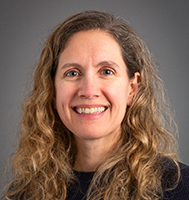Q&A with Hannah Wakefield, MD, MPH, assistant professor, Division of General Pediatrics and Adolescent Medicine

Hometown: Grants Pass, Oregon
Educational/professional background: I graduated with a BA from Coe College in Cedar Rapids, Iowa, and then became a Peace Corps Volunteer in The Gambia, West Africa from 2006 to 2008. I completed a Master of Public Health program at Georgia State University in Atlanta and served as an epidemiology assistant with the National Center for Emerging and Zoonotic Infectious Diseases with the Centers for Disease Control and Prevention in Atlanta, Georgia, for a year. From 2010 to 2011, I worked as an epidemiologist with the Hospital Associated Infections Team, Tennessee Department of Health. I completed my MD at the Pennsylvania State University College of Medicine in 2015. I completed my pediatric residency at the Medical University of South Carolina in Charleston in 2018.
Previous position (title, institution): I was a general pediatrician at Health Care Partners of South Carolina in Conway, South Carolina, as well as an affiliate professor in pediatrics at the Medical University of South Carolina in Charleston.
What is your field of research or area of clinical care, and how did you get into it? Between college and graduate school, I was a Peace Corps Volunteer in The Gambia. This fueled my love of international medicine and serving the underserved. I continued volunteering overseas in the Dominican Republic, Peru, and Tanzania during my medical school and residency training. As a National Health Service Corps Scholar, I worked as a general pediatrician at Federally Qualified Health Centers in South Carolina. In this work, I served medically underserved families, including families from rural neighborhoods and also recent immigrants from South and Central America. I have extensive experience taking care of children with ADHD and autism, along with experience coordinating care for children with complex medical needs. I also have a green belt in Lean Six-Sigma for quality improvement in the clinical setting.
How would you describe your work to a 5-year-old? I work with parents to help ensure that their children are growing big and strong, I help kids feel better when they’re sick, and I hope that I help kids see how cool and special they are.
What attracted you to UW–Madison? The people! Everyone I’ve met loves their job and is dedicated to making their community a better place to live.
What is your favorite thing to do in Madison? I love how many activities are available for children! We have a 4-year-old, so we spend our weekends visiting the nearby children’s museums and playgrounds.
What’s one thing you hope trainees will learn from you and your work? I hope they learn to meet families where they are, to understand what resources a family may need, and how to connect families to those resources.
Do you feel your work relates to the Wisconsin Idea? If so, please describe how. My work, and the work of all pediatricians, is helping families care for and feel more confident in caring for their children.
What’s something interesting about your area of expertise you can share that will make us sound smarter during video chats and parties? Pineapple contain an enzyme called bromelain, which can soothe an irritated throat. It breaks down mucus and reduces inflammation. So, if you have pharyngitis (and you’re not allergic), drinking pineapple juice or eating fresh pineapple juice can help you feel better faster.
What are some of your hobbies and other interests? I am a book dragon, so I love reading and hoarding books in all formats (print, e-reader, audiobooks). When the weather is nice, I enjoy walking, hiking, and visiting local playgrounds with our son.